Daily Vocabulary Words: List of Daily Used Words
Hi there. Welcome to this special section @ Wordpandit.
Our endeavour here is straightforward: highlighting important daily vocabulary words, you would encounter in The Hindu. This is your repository of commonly used words; essentially, we are posting a list of daily used words. Hence, this has significant practical application as it teaches you words that are commonly used in a leading publication such as The Hindu.
Visit the website daily to learn words from The Hindu.
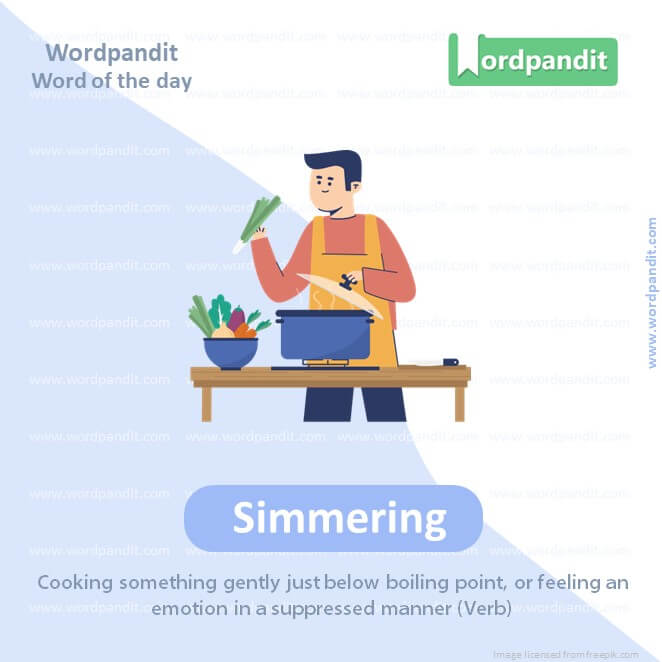
WORD-1: Simmering
CONTEXT: To a significant extent, the House has become the testing ground for factional supremacy within the ranks of the Republican Party, a simmering conflict that has intensified as the presidential election of November 2024 has drawn closer.
SOURCE: The Hindu
EXPLANATORY PARAGRAPH: Imagine you’re making soup, and it’s not boiling but bubbling just a little on the stove. That’s called “simmering.” It means cooking slowly over low heat. It can also mean when someone’s anger is quietly building up inside them.
MEANING: Cooking something gently just below boiling point, or feeling an
emotion in a suppressed manner (Verb).
PRONUNCIATION: SIM-er-ing
SYNONYMS: stewing, bubbling, brewing, seething, heating
USAGE EXAMPLES:
1. The soup was simmering gently on the stove.
2. Her frustration was simmering under the surface during the meeting.
3. The disagreement between the friends had been simmering for months.
4. The excitement in the crowd was simmering as the concert time neared.
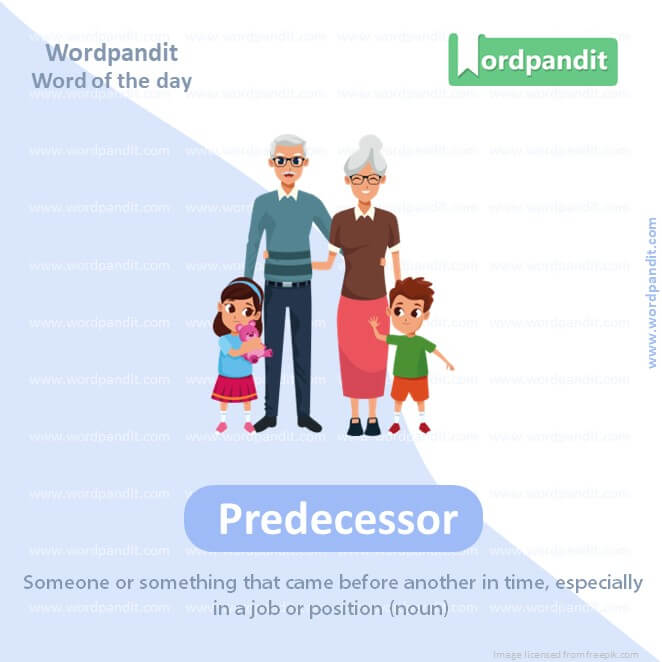
WORD-2: Predecessor
CONTEXT: The lower house witnessed a similar pattern of turmoil during the election of Mr. Johnson’s immediate predecessor, California Congressman Kevin McCarthy, who had to engineer no fewer than 15 rounds of voting to finally secure the Speaker’s chair.
SOURCE: The Hindu
EXPLANATORY PARAGRAPH: Imagine you have a new teacher, but before them, there was another one who taught you. That first teacher is the “predecessor.” It’s someone who had the job before the current person.
MEANING: Someone or something that came before another in time, especially
in a job or position (noun).
PRONUNCIATION: PRED-uh-ses-er
SYNONYMS: forerunner, ancestor, precursor, antecedent, former occupant
USAGE EXAMPLES:
1. The new president honored his predecessor during the ceremony.
2. This car is more efficient than its predecessor.
3. Her predecessor retired after 20 years of service.
4. The current principal decided to follow the policies set by his predecessor.
WORD-3: Abruptly
CONTEXT: Ultimately Mr. McCarthy was dismissed from the role in late October 2023 when his tenure was abruptly ended by a motion to vacate foisted by members of the House Freedom Caucus.
SOURCE: The Hindu
EXPLANATORY PARAGRAPH: If you’re talking with someone and they suddenly stop and walk away without saying goodbye, they did it “abruptly.” It means doing something quickly and without warning.
MEANING: Suddenly and unexpectedly (adverb).
PRONUNCIATION: uh-BRUPT-lee
SYNONYMS: suddenly, unexpectedly, sharply, quickly, immediately
USAGE EXAMPLES:
1. The train came to a stop abruptly when it reached the station.
2. He turned and left the room abruptly after the argument.
3. The meeting ended abruptly when the fire alarm rang.
4. She abruptly changed the topic when the conversation got too personal.
WORD-4: Vacate
CONTEXT: Ultimately Mr. McCarthy was dismissed from the role in late October 2023 when his tenure was abruptly ended by a motion to vacate foisted by members of the House Freedom Caucus.
SOURCE: The Hindu
EXPLANATORY PARAGRAPH: If you’re playing on a swing and your friend wants a turn, you have to “vacate” the swing so they can play too. It means leaving a place so someone else can use it.
MEANING: To leave a place or position (verb).
PRONUNCIATION: VAY-kayt
SYNONYMS: leave, exit, abandon, clear out, move out
USAGE EXAMPLES:
1. The hotel guests were asked to vacate their rooms by noon.
2. He will vacate his office when his replacement is hired.
3. The tenants had to vacate the building due to the fire.
4. She was told to vacate the premises immediately.
WORD-5: Foisted
CONTEXT: Ultimately Mr. McCarthy was dismissed from the role in late October 2023 when his tenure was abruptly ended by a motion to vacate foisted by members of the House Freedom Caucus.
SOURCE: The Hindu
EXPLANATORY PARAGRAPH: If your friend makes you hold their backpack even though you don’t want to, they “foisted” it on you. It means forcing someone to accept something they don’t really want.
MEANING: Forced someone to accept something unwanted (verb, past tense).
PRONUNCIATION: FOY-stid
SYNONYMS: imposed, forced, dumped, unloaded, burdened
USAGE EXAMPLES:
1. He foisted the responsibility of cleaning up on his younger brother.
2. The manager foisted extra work on the interns.
3. They felt like the new regulations were being foisted upon them.
4. The salesman foisted a broken appliance on the unsuspecting customer.
WORD-6: Festering
CONTEXT: Even as Voting Day approaches fast from the horizon, moderate congressional Republicans are faced with the festering dilemma that to win their re-election bids they cannot be seen as spoilers who made it harder for Congress to forge critical bipartisan legislation.
SOURCE: The Hindu
EXPLANATORY PARAGRAPH: Imagine getting a small cut, and instead of healing, it gets red and swollen because it wasn’t taken care of. That’s “festering.” It means a wound that’s getting worse. It can also mean problems that keep growing because they aren’t solved.
MEANING: Becoming worse and more infected (verb, present participle). Growing worse because of neglect or not being addressed (adjective).
PRONUNCIATION: FES-ter-ing
SYNONYMS: decaying, rotting, deteriorating, worsening, rankling
USAGE EXAMPLES:
1. The untreated wound was festering badly.
2. Resentment was festering among the team due to unfair treatment.
3. She tried to clean the festering sore, but it needed medical attention.
4. The festering tension between the siblings finally erupted into an argument.
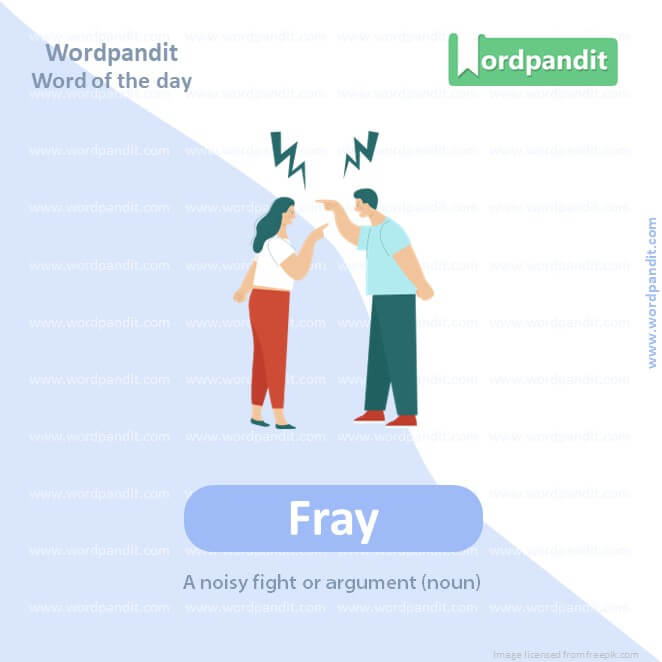
WORD-7: Fray
CONTEXT: In some remote areas, people do not know which political parties are in the fray, but they vote so that they are not struck off the rolls.
SOURCE: The Hindu
EXPLANATORY PARAGRAPH: Imagine a rope that starts to come apart at the ends, making it look messy. That’s “fray.” It means something is coming apart or getting worn out. It can also mean a fight or argument.
MEANING: Becoming worn out or unraveled at the edges (verb). A noisy fight or argument (noun).
PRONUNCIATION: fray
SYNONYMS: wear, unravel, tatter, brawl, scuffle, dispute
USAGE EXAMPLES:
1. The old sweater started to fray at the cuffs.
2. Her patience began to fray after waiting for hours.
3. The dog jumped into the fray to protect its owner from the attacker.
4. The politician was prepared to enter the fray of the debate.
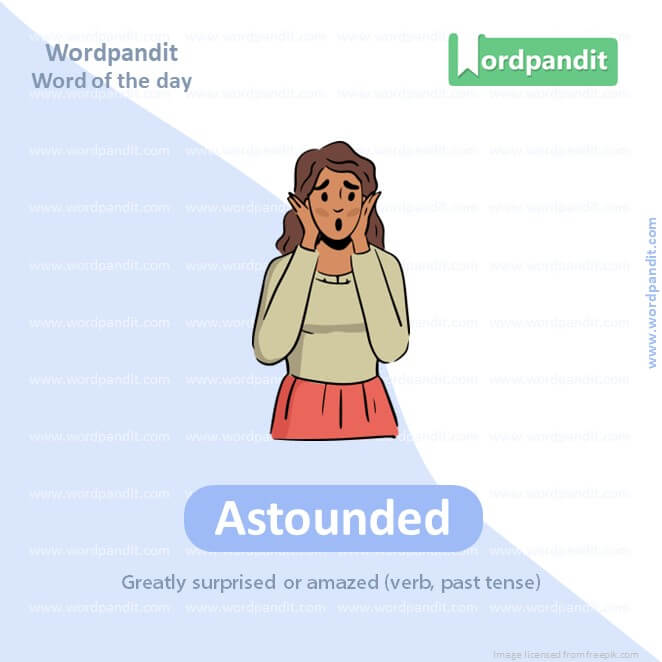
WORD-8: Astounded
CONTEXT: Every time I have travelled to rural India, I have been astounded by how much the people of urban India take access to basic necessities for granted.
SOURCE: The Hindu
EXPLANATORY PARAGRAPH: If you see someone do a magic trick that leaves you speechless, you’re “astounded.” It means being very surprised or amazed.
MEANING: Greatly surprised or amazed (verb, past tense).
PRONUNCIATION: uh-STOWN-did
SYNONYMS: amazed, shocked, astonished, stunned, flabbergasted
USAGE EXAMPLES:
1. She was astounded by the magician’s incredible performance.
2. The children were astounded to see the giant dinosaur at the museum.
3. He was astounded to receive a promotion so soon.
4. The teacher was astounded by the student’s creativity in her project.
WORD-9: Morphological
CONTEXT: When Sam Pitroda said what he did about India’s morphological diversity, almost all the mainstream channels blew the issue out of proportion.
SOURCE: The Hindu
EXPLANATORY PARAGRAPH: Imagine a caterpillar changing into a butterfly, and you can see how its shape and form change. That’s “morphological.” It means relating to how something changes shape or form.
MEANING: Relating to the form and structure of things, especially living organisms (adjective).
PRONUNCIATION: mor-fuh-LOJ-ih-kul
SYNONYMS: structural, anatomical, form-related, shape-related
USAGE EXAMPLES:
1. The scientist studied the morphological changes in insects during growth.
2. The morphological differences between the two plants were significant.
3. She analyzed the morphological characteristics of various bird species.
4. The study highlighted the morphological adaptations of desert plants.
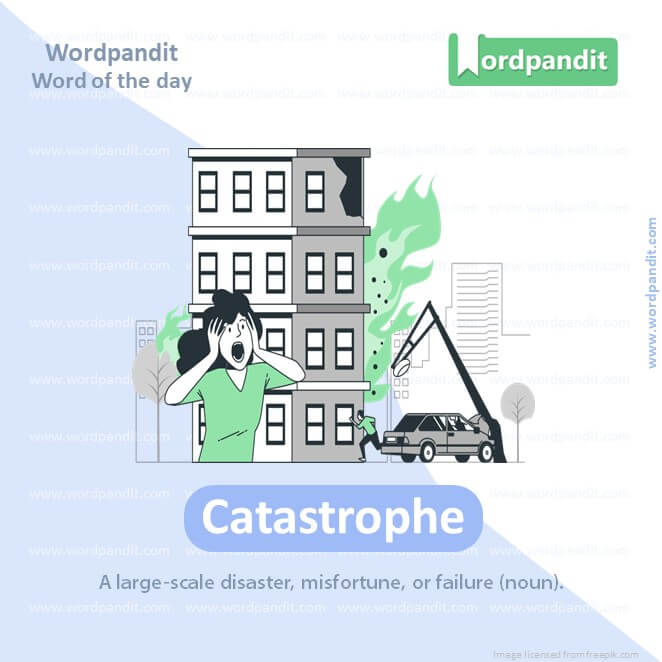
WORD-10: Catastrophe
CONTEXT: Dread and urgency, once again, have driven students across campuses in the United States to protest against the catastrophe in Gaza.
SOURCE: The Hindu
EXPLANATORY PARAGRAPH: Imagine you build a tower of blocks, and it suddenly crashes down, making a huge mess everywhere. That’s a “catastrophe.” It means something terrible that happens suddenly and causes a lot of trouble.
MEANING: A large-scale disaster, misfortune, or failure (noun).
PRONUNCIATION: kuh-TAS-truh-fee
SYNONYMS: disaster, calamity, tragedy, devastation, crisis
USAGE EXAMPLES:
1. The earthquake was a catastrophe that left many people homeless.
2. The chef dropping the entire cake was a baking catastrophe.
3. The oil spill created an environmental catastrophe.
4. Losing their passports before the trip was a travel catastrophe.
Vocabulary Daily Use Words
In the architecturally diverse world of language learning, ‘vocabulary daily use words’ act as a cornerstone. We often take these words for granted, but their significance in day-to-day communications is nothing short of monumental. Mastering these ‘vocabulary daily use words’ should be more than an ancillary task on the sideline; it should take the center stage in your language learning journey.
To begin with, approach ‘vocabulary daily use words’ with the same gusto and reverence as you would an untapped treasure chest. Go beyond the conventional realm of textbooks and explore the world of contemporary literature, newspapers, and digital content. By immersing yourself in these mediums, you’re aligning your learning with real-world language usage, thereby gaining a practical understanding of ‘vocabulary daily use words.’
Memory-enhancing tools add an extra layer of effectiveness to your learning. Flashcards, for example, are a great way to make your study sessions interactive and memory-forging. Coupled with the Leitner system, which is a principle of spacing and repetition, you can ensure better recall and understanding of ‘vocabulary daily use words.’
Furthermore, leveraging mnemonic devices aids in etching the ‘vocabulary daily use words’ into your memory. Associating common words with unique and memorable narratives in your mind enhances their recall. Regular revision and using these words in routine conversations further cement your proficiency.
The potency of immersion as a language learning strategy cannot be emphasized enough. Conversing with native speakers, if possible, provides context to ‘vocabulary daily use words’ and boosts your fluency.
In conclusion, mastering the ‘vocabulary daily use words’ is an enriching journey that requires ongoing effort, continual exposure, and hands-on practice. The strategy of learning through various mediums, using memory-enhancing techniques, leveraging mnemonic devices, and immersion can help demystify these words and enhance your overall language proficiency. So, gear up and embrace the linguistic adventure of mastering the ‘vocabulary daily use words.’











